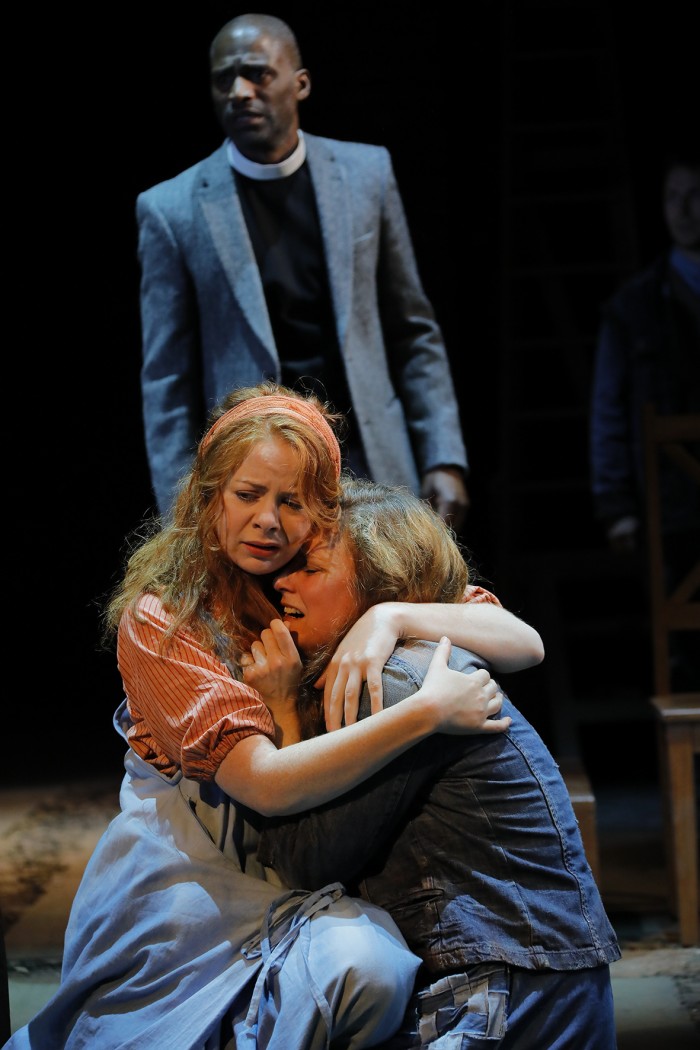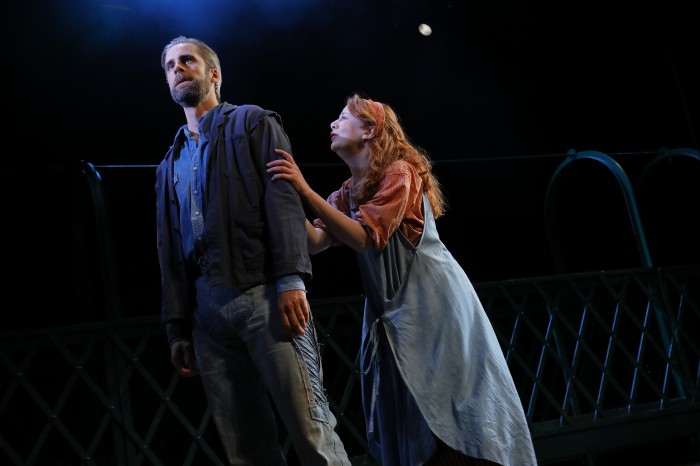×
As I sit in the audience of The Crucible at Pitlochry Festival Theatre, I overhear a group talking behind me. 'This set doesn't really inspire me,' one says just loud enough to heard by everyone in the vicinity, 'and I don't remember there being electric guitar and drums in 'The Crucible.' Her friend adds, 'I don't like that there isn't a curtain now. When you come to the theatre you expect to see a curtain.'
Personally, I really like the set design and although a curtain-less theatre is a bold choice - you could argue that it removes an unnecessary layer of artifice. I contemplate turning round and saying so but then think again. Getting in an argument with a group of retiree's over the relative merits of curtainless theatre could seem a little... well... unseemly.
I really like the set design and although a curtain-less theatre is a bold choice it removes an unnecessary layer of artifice.It's weird to think that I've lived in Perthshire nearly my whole life and this is the first time I've seen a play at the PFT. I've been to a couple of gigs here (including an amazing Bruce Springsteen tribute) and I think I saw a puppet show here once on a primary school outing!
Tonight, the repertory cast will be exhuming McCarthyism, and breathing life into Arthur Miller's classic allegorical play, 'The Crucible'. Although nominally about the Salem witch trials that occurred in Massachusetts in the 1690s, it is rather famously a thinly veiled attack on a different witch hunt, the House of Un-American Activities Hearings.
The hearings were designed to seek out high-profile members of the American Communist Party by getting their colleagues to identify them. The members were then 'blacklisted,' effectively ending their career. In 1952 Miller's good friend, the filmmaker Elia Kazan,  out-ed eight members of the Group Theatre as communists. After speaking to Kazan about his testimony, Miller travelled to Salem to research the witch trial's and in January 1953 'The Crucible' debuted on Broadway.
out-ed eight members of the Group Theatre as communists. After speaking to Kazan about his testimony, Miller travelled to Salem to research the witch trial's and in January 1953 'The Crucible' debuted on Broadway.
I'm not really that familiar with the play but I find myself very quickly getting drawn into the story. For some reason, I'm surprised that the play begins shortly after an actual attempt at witchcraft by one of the main characters, Abigail, and her friends.
The village is already rife with rumours of witchcraft and a crowd has gathered outside Rev Parris' (Abigail's uncle and guardian). Things escalate quickly, with the girls avoiding blame by accusing everyone and their neighbour of witchcraft, using the opportunity to settle scores along the way.
It is Elizabeth Proctor who is portrayed by Clare Dargo with a real sense of resilience, humanity and justice that forms the heart of the play for me though.The cast is impressive, particularly Harry Long as John Proctor and Fiona Wood as the vengeful Abigail. It is Elizabeth Proctor who is portrayed by Clare Dargo with a real sense of resilience, humanity and justice that forms the heart of the play for me though. Dargo's and Long's scene together in the final act is particularly powerful.
As always at PFT, the performances are even more impressive when you consider that these actors appear in several productions of varying tone throughout the week. I mean, Daniel Day-Lewis was pretty good in the 1996 film version of 'The Crucible' but he sure as hell didn't have to act in a production of 'Summer Holiday' and 'Blithe Spirit' between takes.
It's interesting to note that Miller's play resonates beyond just witch trials and McCarthyism. There have been a number of events since the play's debut  that it could almost be referring to. Watching it put me in mind of the 'satanic panic' scare of the 1980s that found everyone from teachers to heavy metal bands being accused of converting our youths to devil worship. Also, you don't have to look too hard to see the parallels between 'The Crucible' and the concocted Orkney child abuse scandal of the early '90s.
that it could almost be referring to. Watching it put me in mind of the 'satanic panic' scare of the 1980s that found everyone from teachers to heavy metal bands being accused of converting our youths to devil worship. Also, you don't have to look too hard to see the parallels between 'The Crucible' and the concocted Orkney child abuse scandal of the early '90s.
The play has an enduring prescience because it is based on tropes and traits of society that, unfortunately, aren't likely to change any time soon. This might all sound very heavy going but 'The Crucible', although weighty, is endlessly entertaining and compelling. Well worth the drive from Perth to Pitlochry to see.
The Crucible will show until September 27th at Pitlochry Festival Theatre.
Perth Festival of the Arts has joined forces with its 2020 artists to create a 10-day online celebration to ‘celebrate the arts together'.
May 21st Thursday 2020
Dougie Maclean's new Perthshire festival this summer: Cardney Concerts.
March 18th Wednesday 2020
Party at The Park, the South Inch, 27th and 28th June, will feature fantastic live performances from The Charlatans and many more!
March 12th Thursday 2020